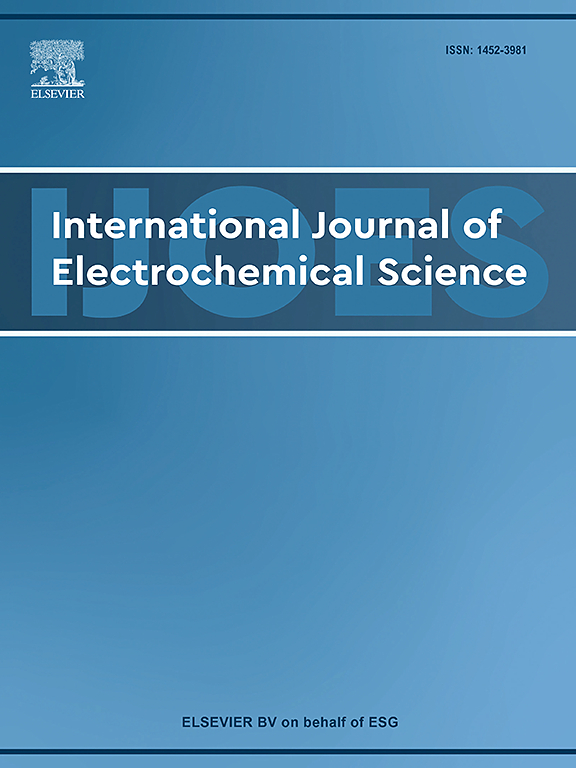Tangerine peel-derived nitrogen doped porous carbon as electrode material for high-performance supercapacitors
IF 2.4
4区 化学
Q4 ELECTROCHEMISTRY
International Journal of Electrochemical Science
Pub Date : 2025-05-28
DOI:10.1016/j.ijoes.2025.101081
引用次数: 0
Abstract
Nitrogen-doped hierarchical meso/microporous carbons were successfully synthesized from tangerine peel through pyrolytic activation at elevated temperature in nitrogen atmosphere, utilizing potassium hydroxide as activator and melamine as nitrogen source. The resulting optimal hierarchical carbon (denoted as NBC-600) possessed a high specific surface area of 601.49 m2·g−1, along with a nitrogen doping level of 2.5 %, both of which contribute significantly to its outstanding supercapacitive performance. Electrochemical evaluations reveal that the NBC-600 electrode delivers an excellent gravimetric specific capacitance of 304.4 F·g−1, accompanied by excellent cycling stability and rate capability. Moreover, a symmetric two-electrode supercapacitor assembled with NBC-600 achieves an energy density of 26.8 Wh·kg−1 at a corresponding power density of 250.0 W·kg−1. Notably, the device demonstrates exceptional cycling stability, retaining 96.9 % of its initial capacitance after 10,000 charge-discharge cycles at a current density of 10 A·g−1. The superior electrochemical properties of NBC-600 surpass that of numerous biomass-derived hierarchical porous carbons, underscoring its feasibility as a cost efficient and high-performance electrode material for next-generation supercapacitors.
橘皮衍生氮掺杂多孔碳作为高性能超级电容器的电极材料
以陈皮为原料,以氢氧化钾为活化剂,三聚氰胺为氮源,在氮气气氛中高温热解活化,成功地合成了氮掺杂层次介孔/微孔碳。得到的最优层次化碳(表示为NBC-600)具有601.49 m2·g−1的高比表面积,以及2.5 %的氮掺杂水平,这两者都是其出色的超级电容性能的重要原因。电化学评价表明,NBC-600电极具有304.4 F·g−1的优良重量比电容,并具有良好的循环稳定性和速率能力。此外,用NBC-600组装的对称双电极超级电容器在相应的功率密度为250.0 W·kg - 1时,能量密度为26.8 Wh·kg - 1。值得注意的是,该器件表现出优异的循环稳定性,在10 a·g−1的电流密度下,在10,000次充放电循环后,其初始电容保持了96.9 %。NBC-600优越的电化学性能超过了许多生物质衍生的分层多孔碳,强调了其作为下一代超级电容器的成本效益和高性能电极材料的可行性。
本文章由计算机程序翻译,如有差异,请以英文原文为准。
求助全文
约1分钟内获得全文
求助全文
来源期刊
CiteScore
3.00
自引率
20.00%
发文量
714
审稿时长
2.6 months
期刊介绍:
International Journal of Electrochemical Science is a peer-reviewed, open access journal that publishes original research articles, short communications as well as review articles in all areas of electrochemistry: Scope - Theoretical and Computational Electrochemistry - Processes on Electrodes - Electroanalytical Chemistry and Sensor Science - Corrosion - Electrochemical Energy Conversion and Storage - Electrochemical Engineering - Coatings - Electrochemical Synthesis - Bioelectrochemistry - Molecular Electrochemistry

 求助内容:
求助内容: 应助结果提醒方式:
应助结果提醒方式:


